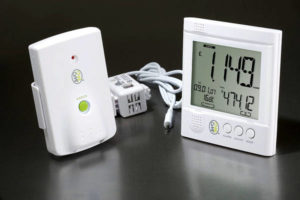Jules and Becca have been looking at how to make their home more energy efficient. As part of this, they looked at their electricity consumption, and with a few simple changes were able to halve their electricity usage, saving themselves around £600 per year. Here is Jules’ account of how they did it.
Becca and I decided that we should look at optimising our energy usage, initially electricity. Our basic strategy was:
- Work out how much energy we were typically using
- Find out what the main contributors to it are
- Choose the easiest things to improve
- Go back to step 1.
We worked out our average electricity usage by looking back through our bills for pairs of dated meter readings. The meter units are in KWh so the difference between two readings divided by the number of days between them gave us the average daily KWh.
Our average of 20 KWh seemed pretty high, the UK average is less than 10 KWh per day and we use gas for our hob, hot water and central heating. Every KWh we could save from average daily usage would be £60 a year.
We now had motivation but we needed a way to figure out where all that energy was going. We started recording our meter reading daily. We don’t yet have a smart meter so, I installed an energy meter (I used an OWL Micro+ CM180, which cost about £50, there are many others available). The meter clips to the cables that feed our fuse box and gives a continuous estimate of electricity consumption on a wireless digital display.
So, one evening, with energy monitor in hand, we decided to figure out where all that money was going. The monitor was going up and down pretty regularly as fridges and heating were going on and off, and we knew we weren’t going to get rid of them quickly so we just turned them off (temporarily) and that largely stabilised the reading.
Then we powered down anything that wouldn’t handle a power cut well, basically our desktop computers and our server (NAS), and noted the change in reading for each one.
Shutting down our NAS saved about 60 watts on the meter, as 1 watt of base load (ie on all the time) costs about £1.50 on our annual bill, that’s using about £90 a year.
That left a lot of base load, and a seemingly random fluctuation.
We then went through a process of turning on/off fused circuits and plugs to figure out what the rest of the usage was. It actually turned out to be easier to get things down to zero and then build back up, but in the end we had a pretty clear picture of where the power was going and a set of ideas for reduction.
So, what did we learn?
- Our energy meter could take 10 seconds to update and was only accurate to maybe 30 watts, both got worse as the load got smaller (a smart meter should be more accurate)
- Biggest surprise was: we have a couple of 28 Watt fluorescent lights with night/movement sensors on the front of our house; these use a ridiculous 144 watts and were coming on randomly day and night. In the short term we’ve pulled out the bulbs until we can fix the sensors.
- In general our energy saving bulbs do their job, but we have a few lights that use an unexpected amount of power, mostly 2D fluorescents, and some of those are on a lot. The worst culprit is our fluorescent kitchen lights. Those that are on the most we’ll switch to LED bulbs, and we’re more aware of turning off lights that aren’t needed.
- It turns out we had a bunch of devices that were using significant power (> 10 watts) when in standby mode. Our Sky box and SONOS speakers are both examples of this. We’ve found we can turn off most of these when they’re not in use.
- Some of the equipment we had on all of the time, was a pain to turn off, but in many cases we’ve found ways to make it easier/quicker or discovered it wasn’t that inconvenient once we’d changed our habits.
Over a couple of weeks following our time figuring out the usage, we made a series of changes and fixes. We’re not completely done but I think we’ve definitely had the biggest wins.
In the process we got our base load down by maybe 200 watts and cut our daily usage in half. I was actually really surprised how painless it has been, and we should have an extra £600 a year to spend on something else.
